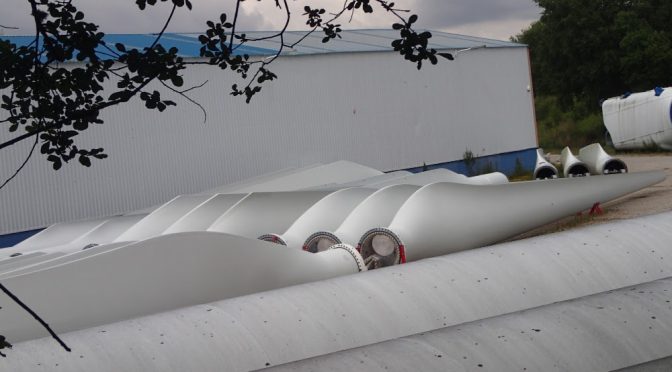The first blade recycling plant project presented in Spain has received recognition from the European Union, granting aid of more than 12 million euros to the consortium in which the project is immersed.
The consortium led by Endesa and PreZero aims to allocate recycled material to the production of new products, thus closing the circle of a new useful life.
The new recycling plant that will be located in Cubillos del Sil (León), is part of Endesa’s Futur-e Plan for the Compostilla thermal power plant currently being dismantled.
The first blade recycling plant project presented in Spain has received recognition from the European Union, within the HORIZONTE EUROPA Framework Programme, as an innovative project that will allow the concept of circular economy to be truly applied, recycling not only the components but also giving them a second shelf life.
This has been pointed out by the European body when granting a subsidy to the “Blades2Build” Project, a project that aims to evaluate and demonstrate on a large scale the possibility of recycling, recovering and reusing this type of element. Blades2Build is made up of an international consortium in which Endesa and PreZero will lead the demonstration phase with the recycling plant initiative in El Bierzo (León). This aid is part of the Framework Program for R&D&i HORIZONTE EUROPE, and will grant a total of 12.3 million euros to the project in which 14 leading European companies and research centers participate. The Spanish blade recycling project will receive this aid €3.2 million.
“This European R&D recognition reinforces the work carried out jointly between Endesa and PreZero in the search for new products made from waste from the wind industry at the future Cubillos del Sil recycling plant,” said Andrés Sanchez-Biezma, Head of Generation Innovation at Endesa, who clarified “the importance of the European Commission’s support for this highly innovative project for the management of this type of waste, a topic of high priority at European level”.
For her part, Mónica Ramos, Director of Operations and Engineering of PreZero in Spain and Portugal, has assured that “this new plant will allow innovation and renewal to be promoted in European wind farms, thus generating a greater volume of green energy obtained in a much more sustainable”. Likewise, Mónica Ramos has indicated that “thanks to this joint project between Endesa and PreZero, progress will be made towards the circular economy in the recycling of blades, thus preventing them from reaching landfill”.
The new facility that is being processed and whose first stone will be laid at the end of 2023, will be located in Cubillos del Sil (León) and is part of Endesa’s Futur-e Plan for the Compostilla thermal power plant, currently in dismantling.
The infrastructure in which the consortium created by Endesa and PreZero Spain will invest a total of 8.5 million euros, responds to the challenge of recycling more than 2,000 wind blade units per year, that is, some 6,000 tons of fiber composite per year of glass and carbon from wind turbines, giving a second life to the materials of the blades by applying circular economy criteria.
Precisely this has been the recognition of the European Union that has seen in the project of reuse and incorporation of recycled materials of fiberglass, carbon fiber and other by-products of the process again in the industry, both wind and other sectors that can sue these compounds.
In addition, Endesa and PreZero are working to make this new facility, which will be operational in 2024, an option for the future in a highly representative area for the energy company. It is estimated that once it comes into operation, close to 30 direct jobs will be created and additional indirect employment associated with logistics tasks will be generated.
Likewise, the new plant will give more competitiveness to the LM Wind Power factory in Ponferrada, as well as to the one that said company manages in Castellón. The recovered fiberglass can be used, among other applications, in sectors such as the automotive, construction or ceramics, thus creating a circular economy in the Spanish wind business.
Additionally, GE Renewable Energy will offer its customers in Spain the option of processing disused blades, and Endesa plans to contribute the blades it no longer uses to its facilities, thus reinforcing the sustainable development of the wind sector.
This solution will make it possible to address the repowering of existing wind turbines. Currently, 27,446 MW (megawatts) of wind power are installed in Spain, of which 22,959 will be more than 25 years old at the end of this decade.


